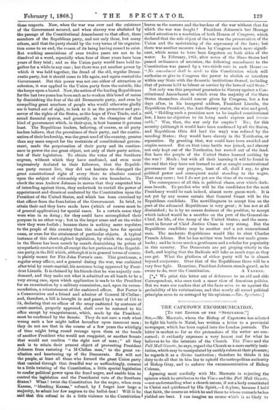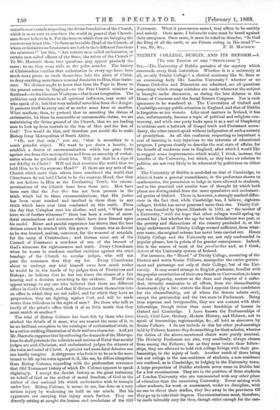THE CAPETOWN EXCOMMUNICATION.
[TO THE EDITOR OF THE " SPECTATOR."]
SIR,—Mr. Macrorie, whom the Bishop of Capetown has selected to fight his battle in Natal, has written a letter to a provincial newspaper, which has been copied into the London journals. The letter is modest so far as the pretensions of the writer are con- cerned; it evidently expresses a very honest zeal for what he believes to be the interests of the Church. The Times and the Pall Mall Gazette, he says, regard the Church as a mere earthly insti- tution, which may be manipulated by earthly rulers at their pleasure; he regards it as a divine institution ; therefore he thinks it his duty to do all that in him lies to uphold the metropolitan authority of Bishop Gray, and to enforce the excommunication of Bishop Colenso.
Agreeing most cordially with Mr. Macrorie in rejecting the opinion which he attributes to the Times and the Pall Mall Gazette, —not understanding what a church means, if not a body constituted in Christ and quickened by His Spirit,—I deplore, because I hold that faith, the course on which he and those to whose counsels he has yielded are bent. I can imagine no course which is so likely to unsettle men's minds respecting the divine foundation of the Church, which is more sure to convince the world in general that Church- men do not believe in it. For the issue to which they are bringing the controversy is not this, "Is there an invisible Head of the Church, of whom ecclesiastics and statesmen are both in their different functions the ministers ?" but this, "Are certain men called ecclesiastics, or certain men called officers of the State, the rulers of the Church ?" To Mr. Macrorie these two questions may appear precisely the same ; to me they seem wide as the poles asunder. The history of Christendom testifies that ecclesiastics in every age have been much more prone to exalt themselves into the place of Christ, to denyanything more than a nominal dominion to Him, than states- men. We divines ought to know that from the Pope in Rome to the poorest curate in England—to the Free Church minister in Scotland—to the itinerant Wesleyan—that is our temptation. The politician may disbelieve in all spiritual influence, may scorn all who speak of it; but that very unbelief saves him from this danger. It presents itself to every one of us under some form or another. What madness, then, to pretend that in asserting the claims of ecclesiastics, let them be reasonable or unreasonable claims, we are maintaining the divine ground of the Church, that we are leading men to look up from mortals to the Son of Man and the Son of God ! You would do that, and therefore you would die to make Bishop Gray Metropolitan of South Africa.
"Oh, not that only ;" you cry, "that is secondary to a much grander object. We want to put down a heretic, to establish a decree of excommunication which has gone forth against one from this metropolitan and from an assembly of ecclesi- astics whom he gathered about him. Will not that be a sign of our fidelity to Christ? Will not that convince the world that we hold Him to be the supreme [lead?" If there are any acts of the Church which more than others have convinced the world that Churchmen do not hold Christ to be the supreme Head, that they do not believe in Him as the Everlasting Truth, the excom- munications of the Church have been those acts. Men have been sure that the Just One has not been present in the trials which led to those excommunications, that His justice has been more mocked and insulted in these than in any trials which have ever been conducted on this earth. From the day that Caiaphas rent his clothes, and said, "What need have we of further witnesses?" there has been a series of sacer- dotal examinations and sentences which have been framed upon his model. Bitter and painful experience has shown that the best divines cannot be trusted with this power. Gerson was as devout as he was learned, zealous, moreover, for the removal of scandals, for the unity of Christendom ; and Gerson came out of the Council of Constance a murderer of one of the bravest of God's witnesses for righteousness and truth. Every Churchman when he wants to condemn another exclaims against the cruel bondage of the Church to secular judges, who will not pass the sentences that they cry for. Every Churchman about to undergo any trial himself owns how much rather he would be in the hands of lay judges than of Presbyters and Bishops ; he believes that he has ten times the chance of a fair hearing and a decision according to the evidence. Would this appear strange to any one who believed that there are different offices in God's Church, and that if divines thrust themselves into an office to which they are not called, and for which they have no preparation, they are fighting against God, and will be made worse than ridiculous in the sight of men ? Do those who talk so loudly of the priest's office think it of so little worth that they must snatch at another ?
The trial of Bishop Colenso has been felt by those who have studied the details of it most, who are nearest the scene of it, to be no brilliant exception in the catalogue of ecclesiastical trials, to be a rather striking illustration of their uniform character. And yet Mr. Macrorie supposes that by enforcing the demands of the Metropo- litan he shall persuade the colonists and natives of Natal that secular judges are anti-Christian, and ecclesiastical judges the utterers of the voice and mind of Christ. A greater and more fatal delusion one can hardly imagine. A clergyman who feels it to be so is the more bound to lift up his voice against it, if, like me, he differs altogether from Bishop Colenso, regarding with the profoundest reverence that Old Testament history of which Dr. Colenso appears to speak slightingly. I accept the Jewish history as the great testimony on behalf of God as the author of moral freedom, of God as the author of that national life which ecclesiastics wish to trample under foot. Bishop Colenso, it seems to me, has done us a very serious injury by weakening its hold on our minds. But his opponents are carrying that injury much further. They are directly setting at naught the lessons and revelations of the Old Testament. What it pronounces sacred, they affirm to be earthly and unholy. Once more, I believe its voice must be heard against their arrogance. Once more, it must be asked in thunder, "Is God the King of all the earth, or are Priests ruling in His stead ?"-



































 Previous page
Previous page